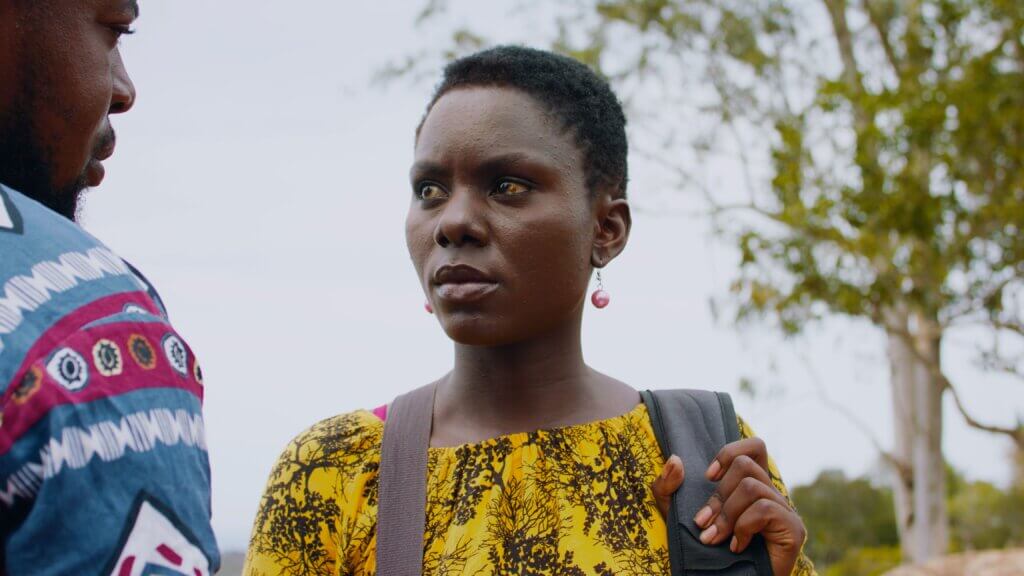Picture a young filmmaker with an enormous dream but faced with harsh economic times to realise this dream. I imagine you’re thinking, isn’t that every filmmaker? Well, not every filmmaker dreams of creating a period piece about the legendary Giriama freedom fighter Mekatilili wa Menza.
For this audacious and ambitious project, Daudi Anguka had been staring at an intimidating excel sheet for hours. When he started working on the budget for his film, he was very optimistic. Only to get the wind knocked out of him as he looked at the numbers. The total budget was over Ksh 20 million. It was a huge dose of reality.
“I figured, since I didn’t have the budget to shoot the period piece about Mekatilili, what else could I do? This was a very challenging spot to find myself in. I started thinking about our modern heroes, average wananchis in the village or living in cities doing great things that nobody knows about,” says Anguka. “That’s when I remembered the tragic story of most kids from the Kenyan coast. Straight from highschool, in their effort to try and get a job abroad, they end up enlisting in rogue agencies and wind up victims of terrible atrocities like organ trafficking. Their families find the corpses of their children with no organs. I wanted to honour the victims and tell their story in a way that people could relate to.”
And that is how Mvera, his directorial feature debut and Kenya’s official entry to Oscars 2024, was born.
Mekatilili is known for escaping a prison in Kisii and walking for over a thousand kilometres to make it back home. Her one goal: to save her people from the grip of the British supremacists. Maybe it’s that same spirit that compelled Anguka to keep moving and transform the period piece into a modern re-imagination of the Giriama hero. Or maybe it’s just experience.
Anguka is not a stranger to filmmaking. In fact, he’s one of the most prominent filmmakers from the coastal region, whose Swahili telenovelas like Pete and Sanura, especially the former, have shattered viewership records for M-Net’s local channel Maisha Magic East, and won awards like the Kalashas. His short film Zilizala (2017) won Best Indigenous Language Movie (Swahili) at 2017 Africa Magic Viewers’ Choice Awards (AMVCA). It is therefore no surprise that Mvera, his first feature film, premiered to a sold out cinema in his hometown of Mombasa.
Anguka’s interest in filmmaking stems from his days at Kajembe High School in Mombasa. He joined the drama club in form three out of curiosity and an itch to fit in, and he fell in love with performing. However it wasn’t easy, Anguka admits
“Back then, I knew I was a good performer. But I was also a newbie and I couldn’t stand up for myself, so I had to settle for small non-speaking roles like opening and closing doors. However, l was excited because I also got to play the main character’s understudy.”
Little did he know that this humbling experience would help him develop the language he now uses to inspire authentic performances from his actors as a director.
Soon after high school, he was sponsored by UNICEF to study film at Kibera Film School under Hot Sun film training in 2014. This was a defining moment in his life. He would find himself constantly on the road, travelling back and forth from Nairobi to Mombasa. Between the experience he was getting and distance from his home, Anguka realised how important it was to tell his own stories. To represent his people.
“I was born at the coast, and as an artist, I’m highly influenced by the Mijikenda culture. Growing up, the stories around me weren’t fused with culture even though there was a need from the consumer to understand how culture was represented in Kenyan films. That’s why Nigeria and Nollywood are such a force. They’ve found a way to explore their culture in even the costumes they choose to have their characters wear. You automatically find yourself falling in love with their way of being. And that’s why I chose to focus on centering the conversation of culture in my films regardless of whether the film is a period piece or set in modern times.”
His hit Swahili telenovela Pete, set in the picturesque Funzi island, is a story dipped in Swahili culture and mythology of Mamba Muntu (mermaids) where two brothers fight over a leadership ring after their father, the chief of Funzi, dies before naming a successor. Set against a rich Swahili cultural heritage at the very heart of Lamu and its sister islands of Pate and Shela, Sanura, his most recent telenovela, follows a young woman caught between preserving ancient traditions and forging her own path. Anguka’s appreciation of culture as a filmmaker has helped him harness a surge of creative energy, and there lies his ability to create his very unique cinematic style that elevates his projects to greater heights.

“One thing I believe is, story without culture does not make sense. For me to be able to represent the Kenyan coast as authentically as possible, I need to start with a well crafted narrative. But that’s not to say that a story cannot exist without an infusion of culture. We currently have many decent films that fall in that category. My point is, to achieve a powerful, timeless film, you cannot separate the authentic representation of our people and their ways from the story. Because we do have a culture but we’re not representing it as filmmakers,” Anguka explains.
Fundamentally, we are what we eat and what we wear. In the Kenyan film and TV industry, for a long time, our stories have been what colonial hang ups and western mainstream entertainment have taught us to be, seeing our culture as a kind of mundaneness we have to shun from. Nothing rings truer for Anguka than this and his appreciation for the Giriama community and the great Mekatilili, whose presence shines through in Mvera.
“Representing my own interpretation of my culture has really enriched my projects. For instance, Pete was very popular in Tanzania and across the rest of East Africa. But what I’m mostly interested in is viewership from a Kenyan audience,” says Anguaka. “When I was making Mvera, I first chose to recognise our past heroes. Very few people know that there was once an old woman who stood up to a white British supremacist and even slapped him. That’s why it was important to juxtapose a fictional modern hero and a past hero. We have to remember heroes like the great Mekatilili wa Menza in order to recognize the shapes, forms and armour our modern heroes have taken on.”
Through its stubborn and bold lead (an extremely applaudable performance by Linah Sande), Mvera allows us to re-imagine our past heroines. By presenting Sande’s Mvera as a reincarnated as a young warrior setting out to fight present day injustice, the film forces us to interrogate the link between our past and present existence. It provokes a conversation about our disregard for our own culture, the relentless fight of freedom fighters like Mekatilili and the current social injustices that plague us.
But the social commentary doesn’t overwhelm Mvera as would be expected of a film that would dare to reimagine the story of a great warrior like Mekatilili. Even in its ambition, this film remains intriguing and hooks the viewers from beginning to end, and that’s because of the dedication Anguka poured into the story.
“What I did was, when working on the first draft, was choose writers from Mombasa. Then I turned to writers from Nairobi for feedback. One of them was Voline Ogutu. She fell in love with the story and worked on the second draft. Mvera had eight drafts. I think it depends on the writer, their level of interest and their strength in the genre. I worked with Voline for two years on this story,” Anguka says.

Working with novice actors is one of the challenges most directors immediately shy away from. However, with Mvera, Anguka embraces this with such confidence and grace because telling a story that is homegrown demands a local cast and crew.
“I took a huge risk. One thing I reminded myself is that this was my first feature film and because I was born and bred in Mombasa, it was important that I start by harnessing talent from home before I explored other regions,” says Anguka. “That’s why I worked with young actors who were coming up in the industry together. My biggest supporters were upcoming artists, and just as it was my first feature film it was also theirs. This was a special connection.”
But as a big agitator for the advancement of the coastal film industry, Anguka doesn’t have it easy. Compared to Nairobi where most film projects are concentrated, the film industry at the coast has been sidelined due to limitations like lack of government support, limited film infrastructure, harsh taxation and penalties just to mention but a few. This has slowly crippled local creatives.
“There’s a stagnation when it comes to the growth of the coastal film industry. Ever since I started working on projects at the coast, things haven’t been easy. In Nairobi, you can see things are moving. The filmmakers’ technical expertise is growing while in Mombasa it seems to be deteriorating. Most of the time if I don’t have a project I’m working on, the local filmmakers will shoot their films in the village and choose to only exhibit them there. The industry isn’t growing and it’s going through a lot of challenges. I want to be part of a world that has progress,” Anguka says
Anguka’s frustrations about the state of the film industry at the coast and about film financing mirrors recent discussions in the whole industry. Across the board, finances is every Kenyan filmmaker’s biggest hindrance. How are we making money from our films? Where are we getting finances to make films? Do our local creatives understand filmmaking as a business? All these questions and so much more riddle filmmakers about to embark on a production.
Unlike many filmmakers, and despite the challenges, Anguka eventually shot his re-imagined film. He was able to raise Ksh 8 million for his budget, but this figure too did not come without its struggles.
“Imagine taking out a loan so that you’re able to complete shooting your film,” he ponders. “All I can say is when it comes to the business of film, it’s a process of learning. Over the years I’ve been saving up to fund this project. Working on long-term TV series (telenovelas) has made it possible to build myself up. But I do hope that more filmmakers would invest in more feature films regardless of the small profit margin. The more feature films we make, the more we will inspire executive producers and investors to fund our films. For this industry to grow, we need more feature films.”
Update: Mvera is now streaming on Netflix.
Enjoyed this article?
To receive the latest updates from Sinema Focus directly to your inbox, subscribe now.











